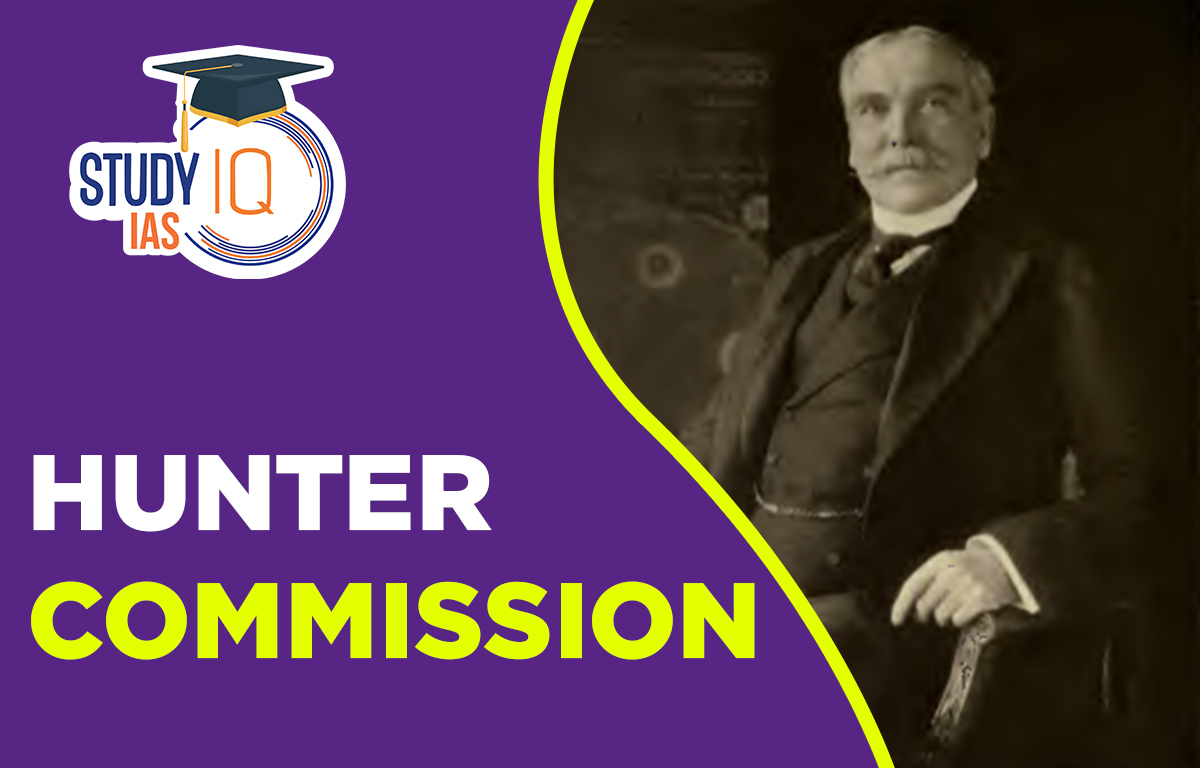Table of Contents
Hunter Commission
Viceroy Lord Ripon appointed the Hunter Commission with the mandate to look into complaints regarding the non-implementation of the Wood’s Despatch of 1854, assess the state of elementary education in the British overseas territories, and make recommendations for its expansion and improvement. In 1882, the commission’s final report—headed by Sir William Wilson Hunter—was delivered. This article will cover the Hunter Commission, which is useful for preparing for the UPSC exam.
Read More: British Administration System
Hunter Commission Objectives
Hunter Commission was to evaluate the current condition of education in India, with a primary education in focus, and to offer suggestions for improvement. Other Objective was to assess missionaries’ involvement in education. Ask questions about how Wood’s Despatch of 1854 is being implemented and how its grants-in-aid are being used, and offer reform recommendations.
Hunter Commission goal was to determine whether or not the government should be permitted to keep providing its people with education. The major objective of the Hunter commission is to look into the situation of primary education in India, but the committee also chose to look into secondary and higher education. It was instructed to research how governmental institutions and missionary institutions generally stand.
Read More: Macaulay Minute
Hunter Commission Recommendations
A commission headed by W.W. Hunter was established by the government in 1882 to assess the nation’s educational advancement since the Despatch of 1854. The recommendations of the Hunter Commission were mostly focused on basic and secondary education.
Emphasized the need for the state to take extra attention in expanding and improving basic education and that primary education should be taught in the local language. It was suggested that newly established district and municipal bodies take over management of basic education. Brought up the lack of female educational institutions, especially outside of presidency towns, and made suggestions for their extension.
For lower-level government positions, literate candidates were given precedence, and primary schools in impoverished areas were enlarged. District and municipal boards were given control over primary education under the Local Self Government Act. To prevent funding intended for rural schools from being misused by urban schools, the monies were divided into rural and urban zones.
Secondary schools were to be founded by private parties using government funding. Model public schools were to be built in each district to serve as a model for these private institutions. The secondary school curricula were also altered, and different branches were created for both academic and vocational courses. The Raj prohibited the use of missionary schools and promoted Indian enrollment in the private educational system. The growth of girls’ and women’s education was meant to get special consideration.
Read More: Hartog Committee
Hunter Commission Significance
In India’s educational history, the Hunter Commission report is seen as a turning point. The majority of its suggestions were adopted by the British government, which led to the devolution of elementary education. As a result, elementary school students studied British subjects for a much shorter period of time.
In 1882, the Punjab University was established, relieving some of the pressure on Calcutta University. There was a notable increase in the number of pupils enrolled in primary and secondary schools between 1882 and 1901.
Read More: Education System in British India
Hunter Commission Analysis
The first India Education Commission was established by British India (after 1857). The commission correctly noted that primary education has stalled and must thus be given more attention. The commission’s recommendations were adopted, and numerous modifications to the educational system were made.
Read More: Judicial System in British India
Hunter Commission UPSC
The Wood’s Despatch of 1854 was not implemented, the current state of basic education in the British colonies, and possible extensions and improvements were the focus of the historic Hunter Education Commission, which Viceroy Lord Ripon formed. Information regarding the Hunter Commission for the UPSC Exam is provided in this article.


 Jallianwala Bagh Massacre, Date, History...
Jallianwala Bagh Massacre, Date, History...
 Important Lakes of India, State wise and...
Important Lakes of India, State wise and...
 Buddhism History, Origin, Sect, Councils...
Buddhism History, Origin, Sect, Councils...





















